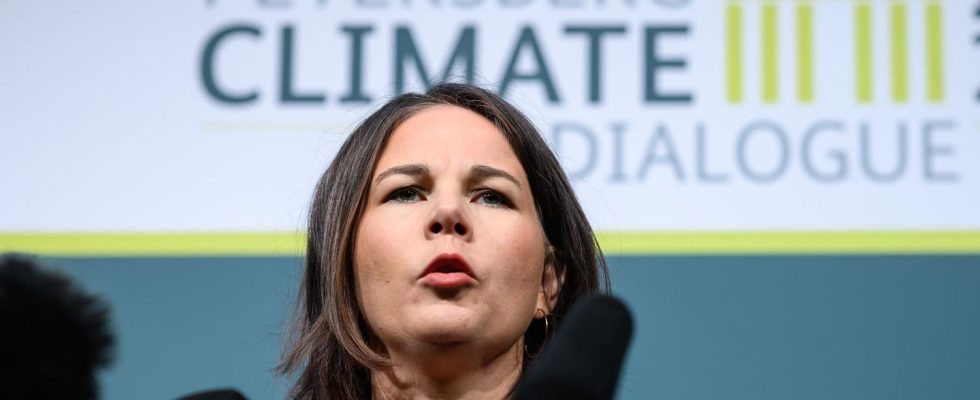Petersberg Climate Dialogue
What is attracting environmental ministers from all over the world to Berlin now of all times?
Annalena Baerbock speaks at the Petersberg Climate Dialogue in Berlin
© Bernd von Jutrczenka / DPA
On Thursday and Friday it will be busy in the federal capital: numerous environmental ministers are traveling to the Petersberg Climate Dialogue. What is the meeting about and what can we expect? Answers to the most important questions.
What happens at the Petersberg Climate Dialogue?
Numerous country representatives travel to the informal meeting every year Berlin to prepare for the World Climate Conference. Environment ministers from industrialized, emerging and developing countries will also be brought together. For two days they will prepare for this year’s climate conference in Azerbaijan’s capital Baku and boost international climate diplomacy.
The first Petersberg Climate Dialogue took place in Bonn in 2010, but has since been moved to Berlin. This year the conference is taking place for the 15th time.
Who organizes the meeting?
The event was organized by the Federal Environment Ministry until 2022; the Federal Foreign Office is now responsible together with the respective host country of the upcoming climate conference. This year, Annalena Baerbock was invited along with the Azerbaijani Environment Minister and designated COP President Mukhtar Babajew.
Which politicians are traveling?
Representatives from around 40 countries have announced their presence at the two-day meeting in Berlin. In addition to Foreign Minister Baerbock and Azerbaijan’s Environment Minister Babjew, Economics Minister Robert Habeck and Development Minister Svenja Schulze will also take part. Chancellor Olaf Scholz is scheduled to give a speech on Friday. Azerbaijan’s President Ilham Aliyev will also take part in the climate dialogue.
What to expect from the meeting?
Not very much. The primary aim is to exchange ideas about the topics and priorities of the upcoming World Climate Conference in November. This year it will probably be about climate finance. “The large economies in particular are in demand – the G20, including the EU, the USA, but especially China, India and countries like Saudi Arabia,” explained the Foreign Office. 80 percent of emissions would be caused by the largest emitters in the G20. “Your emissions reduction will decide whether the 1.5 degree target remains achievable.” The Foreign Office also explained that it is important to include the economy so that future investments are geared towards climate goals.
The managing director of Greenpeace Germany, Martin Kaiser, called for nationally determined contributions to reduce emissions to be significantly increased and for the phase-out of oil and gas to be initiated. “Despite initial measures to limit CO2 emissions, the world continues to heat up and is heading towards an irreversible climate catastrophe,” he warned in a statement.
“As host of the climate dialogue, the federal government should (…) push forward the states’ ambitious climate plans and secure support for new international financing goals,” demands the organization Germanwatch.
What is the World Climate Conference 2024 about?
After the participating states agreed to phase out fossil fuels at COP28 in Dubai, this year’s conference will focus on the question of how the international energy transition can best be implemented. To do this, countries should create new climate goals and plans. “Only if every country develops concrete plans for how it wants to achieve its milestones can it be possible to limit global warming to 1.5 degrees,” the Foreign Office affirms on its website. It is also about the question of how climate protection and the energy transition can be financed.
The global community agreed on the goal of limiting global warming to 1.5 degrees compared to pre-industrial times in Paris in 2015. In view of previous climate protection efforts, it is seen as increasingly unrealistic.
Sources: news agencies AFP and DPA, German climate portal, Foreign Office, Federal Government, Germanwatch


